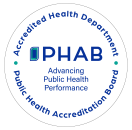*Click Here for Pool/Spa Water Testing Information*
What is a public or semi-public swimming pool?
Any pool, spa, whirlpool or water attraction (e.g. spray pads, fountains) not at a single family dwelling is a public or semi-public pool and subject to regulation by the health department. These include pools at:
- Municipal parks
- Apartments
- Condominiums
- Hotels/motels
- Bed & Breakfasts
- Health care facilities
- Fitness centers
Why does the health department permit and inspect public and semi-public pools?
Preventing a problem is much preferable to reacting after the fact. Using a pool is a safe and healthy activity but given the nature of swimming activities and pool operation infrequent problems can arise. Interaction with pool operators through the permitting and inspection process allows the health department to offer education and answer operator’s questions. Regular inspections of pool facilities increases public safety by helping pool operators comply with federal, state and local codes.
Public and semi-public swimming pools within Vanderburgh County are inspected, and weekly water quality testing is monitored by the Environmental Health Section. Inspections are based on State statutes and local codes and are performed to ensure that acceptable water quality and safe facilities are maintained thus lessening the chance of disease transmission or injury.
How can I help prevent transmission of recreational water illnesses (RWIs)?
There are several simple ways bathers can help prevent RWIs:
- Don’t use the pool if you have been sick or have had diarrhea in the last two weeks
- Shower with warm water and soap before using the pool
- Diaper aged children must use swim diapers
- Have children, and adults as well, take bathroom breaks
- Do not swallow pool water
Click here for information from the Centers for Disease Control on Healthy Swimming.
Prevention of pool related injuries
There are some very simple and low cost steps you can take to promote fun AND safe water recreation at public, semi-public or private pools: Click here for tips to help prevent water-related injuries.
Report a problem at a pool
If you need information on pool operation or have a concern regarding a particular pool, our environmental health specialists will investigate and abate nuisance conditions created by improper operation of public swimming pools. Examples of conditions that should be reported are:
- Physical illnesses after contact with recreational water (e.g. rashes, nausea, diarrhea)
- Drowning, near drowning or injuries
- Discolored or cloudy water
- Strong chlorine odors
- Lack of life saving equipment
- Improper filtration or disinfection
- Unsanitary conditions
Contact the Vanderburgh County Health Department with questions or concerns at: 812-435-2400
or health@vanderburghcounty.in.gov
Swimming Pool Health and Safety Links
Centers for Disease Control – Healthy Swimming/Recreational Water: http://www.cdc.gov/healthywater/swimming/
Indiana State Department of Health – Public Swimming Pool and Spa Program: http://www.in.gov/isdh/23281.htm
Indiana Department of Homeland Security Building Safety & Services: DHS: Swimming
U.S. Consumer Product Safety Commission Pool Safely: http://www.poolsafely.gov/
Swimming Pool FAQs
What is the procedure for a change of ownership?
You must contact our office prior to the change of ownership, apply for a new pool permit (permits are not transferable from location to location), and schedule a change of ownership inspection.
How do I obtain a pool permit for a commercial public/semi-public pool?
Contact our office to schedule an inspection and apply for a permit on our website. Renewal notices are sent out approximately at the beginning of each calendar year.
How much is the pool renewal fee for a commercial public/semi-public pool?
- Permit fees for seasonal public or semipublic swimming pool facilities in 2021 and after shall be one hundred-fifty dollars ($150) per year and seventy-five dollars ($75) for additional recreational water attractions for pools operating between May and September. Permit fees for annual public or semipublic swimming pool facilities in 2021 and after shall be two hundred dollars ($200) per year and one hundred dollars ($100) for additional recreational water attractions.
What is the renewal date for a pool license?
- Year-round pool permits must be renewed by April 1st every year. Seasonal pools must be renewed before opening.
What do I need to do before I can open my commercial public/semi-public pool for the season?
- Make sure your chemical levels are within the allowable ranges. The pool bottom/main drain shall be fastened and be visible from the pool deck. If your facility has a spa the water temperature cannot exceed the maximum allowed temperature (104°F). You must also make sure that you have the appropriate signage and pool safety equipment stored in a proper state of repair. The specific requirements for these rules can be found HERE. And remember! You MUST have a bacteriological sample submitted with satisfactory results prior to opening.
There was an injury at my pool facility; do I need to do anything?
- There is a form provided by the Indiana State Health Department that covers injuries or incidents for specific occurrences that:
- Results in death;
- Requires resuscitation;
- Results in transportation to a hospital or other facility for medical treatment; and/or
- Results in an illness connected to the water quality at the pool.
- The injury/illness report, which can be found HERE, shall be forwarded to the department within ten (10) days.
There was a fecal accident at my pool facility; what should I do?
- In the case of a fecal accident or full stomach vomit incident, please refer to 410 IAC 62.144.
- It is also required that any fecal event occurring in the pool be recorded. That particular incident report form can be found HERE.
Do I need lifeguards at my pool facility?
A qualified lifeguard is required for all public pools. A qualified lifeguard is required for all semipublic pools with a surface area of two thousand (2,000) square feet or more (not including the deck). Lifeguards must be on duty at poolside at all times when the pools are open for use.


